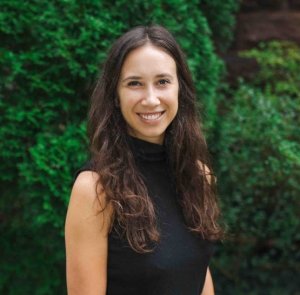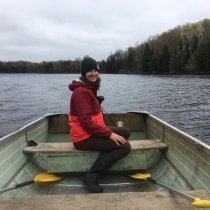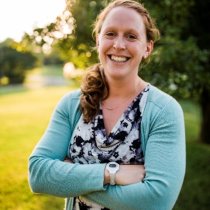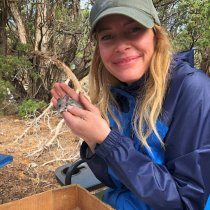Spotlight
Women in Ecology – Janey Lienau
April 17, 2024
The Women in Ecology blog series highlights those who strive to further their science and advance ecology research, many of whom work with NEON data and resources. Coming from all different backgrounds, women scientists in particular encounter challenges along their journey to working in STEM fields. By sharing their stories, we can hope that others will be inspired to follow in their example.
For our latest interview, we spoke with Janey Lienau, a first-year Ph.D. student at the Yale School of the Environment. Lienau’s work in the soil lab focuses on the interaction between animals, plants, and soil in forest ecosystems. Her soil studies during the pandemic were made possible by NEON open data. Below, Lienau shares how her unique upbringing shaped her career aspirations, how she came to love fieldwork and asking questions, and her hopes and dreams for the future.
Can you tell us about your current role?
Ph.D. student life is a hodgepodge of different things. Right now, I’m writing grant proposals to set up new projects, as well as finishing up some old ones. I have lab work and a little bit of fieldwork, as well as some TA (teaching assistant) time squeezed in there. I’m in a soil ecology lab that examines ecosystem processes connected to soil.
How did your early life impact your interests?
I grew up homeschooled in Washington state, and when I was 15, I moved to Hawaii; both places are beautiful. They inspired me to be outside a lot and to think about the environment. I loved being outside as a kid, which I think is the typical story of an ecologist. In high school, I got into gardening and began thinking more about sustainability and agricultural issues. I saw myself doing some type of activism and environmental science or sustainability, and I could see that playing out through filmmaking.
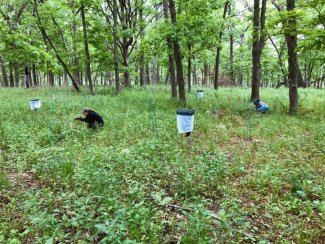
Lienau surveying insects in a temperate forest at The Morton Arboretum. Photo credit: Meghan Midgley.
I wanted to be an environmental activist filmmaker, partly because I had that influence growing up. My parents are filmmakers, and I thought I could take that path early in life. I didn't have research on my mind necessarily, so I worked for a couple years in the film industry before I realized I hated it. I also realized how much I didn't know; I was a home-schooled kid who grew up on two different islands, and as I met new people and worked in the film industry, I said, “Wow, I really don't know anything.” So, I decided to take college classes.
I worked at Starbucks and did online classes in the School of Sustainability at Arizona State University, which was financially viable for me through their college achievement plan. As I got into the curriculum, I was dissatisfied with the online experience and the hardships of working while doing school. But I kept at it for two years and realized I was drawn to more technical questions around environmental science. I then decided to apply to transfer to an in-person school, which was difficult as I didn’t know anything about applying for school, or what options there were for me. I heard from my home-school teacher that there were scholarships at Wheaton College in Illinois, where they had an environmental science degree that aligned with my interests, so I applied there and got in.
Can you tell us about your higher education experience and how you chose your research path?
When I got to Wheaton, they had only one environmental science professor; he researched environmental pollution which I didn’t find particularly engaging. But I was able to take lab and field courses, and this was my first time being in a “real” classroom. I was so overwhelmed but also excited about how much I could learn from being in a lab and being able to take biology courses.
After taking a summer fieldwork course at the Wheaton College Science Station in Hisega, South Dakota – in the Black Hills – I realized: this is how my brain works. I love thinking about interactions and what ecological communities are doing. We spent the summer doing vegetation surveys and other field activities. The next summer, I could do a research internship on an ecology topic, and I thought of soil because of my initial interest in gardening. I spent a lot of time thinking about soil and how to amend it and thought that if researchers ask similar types of questions about interactions and communities within soil, then I could focus on more applied aspects in the future.
I did an REU (Research Education Undergraduate) experience which is funded by the U.S. National Science Foundation. They give an institution money to do a short-term summer project with a student. They have great curriculum guidelines, and you can design your own research project. I found a soil ecology lab at The Morton Arboretum 15 minutes from my school that was running the program – I reached out first to volunteer before starting my program. I felt very lucky. I worked with Drs. Megan Midgley and Rob Buchkowski, who were remote from Western Ontario, Canada, to study soil invertebrates and examine how they relate to nutrient cycles. All of this, believe it or not, was during COVID-19.
Dr. Midgley knew about NEON data and resources and told me to use them to help me with my questions. I spent a lot of time on the NEON website figuring out what data products were useful to my work. I think most people in the field have heard of of used NEON; I hadn’t yet because I didn't have any research experience. I found it easy to find the data products and navigate the site, but I needed to learn how to use platforms such as R, and that was difficult.
NEON has been very helpful to me. The open-source data is available to anyone and allowed me to do a robust research project as someone without any research experience during COVID-19. NEON provided a reliable data source that allowed me to produce publishable research without the setback of needing to conduct fieldwork during the pandemic.
My experience at The Morton Arboretum using NEON data put me on a trajectory for a career in soil ecology research. It enabled me to apply for MESc (Master of Environmental Science) programs, and after graduating from Wheaton, I ended up at the Yale School of the Environment working with Dr. Oswald Schmitz on how ground beetles influence nitrogen cycling. My time as a Master’s student solidified my interest in doing a Ph.D. and I’ve stayed on at the school. Currently, I’m setting up new projects to continue to explore soil animal impacts on ecosystem processes.
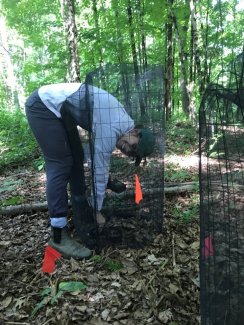
Lienau at Yale Myers Forest field site in eastern CT. Photo credit: Sidney Axtell
What keeps you motivated in your ongoing studies and dedication to this field?
I really like science in general, and I like that there are so many different, interesting questions to be asked; it feels never-ending. I also like the life of a scientist. As an ecologist, you have many different tasks that keep your day interesting. Fieldwork, lab work, writing, reading, etc. It's fun and, for me, self-directed. I feel privileged to be able to set up my life around questions that interest me; it motivates me to work hard to do good research, and I am always motivated to do my best.
How has NEON impacted your research?
For my first research project, I used data only from NEON. It allowed me to address a question with robust data, which let me feel confident in the patterns I saw. I used ground beetle and tree vegetation data from NEON sites to see how vegetation affects ground beetle communities. I found that ground beetle density is higher in deciduous than evergreen forest types, and the proportion of predators increases as evergreen trees do at a site. One implication from this project is that if evergreen tree forest ranges expand due to climate change, we might see correlated ground beetle loss.
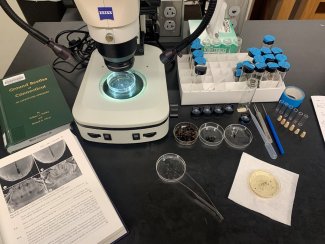
Lienau uses a microscope in the lab to identify ground beetles for her research. Photo credit: Janey Lienau.
What challenges have you faced in the field of STEM, and what advice would you give to others?
I would advise people to not be afraid. I’ve often felt like I’m academically behind or don’t know as much as everyone else. But I think it’s important to push past that and to not let that keep you from asking questions and taking up space in a group; it’s something I’ve had to work on. Secondly, don’t be afraid to put yourself out there, make connections. Maybe that means a “cold email” to someone asking to volunteer before you apply for an internship. I think taking that initiative can be hard for women in general, but be brave and go for it if it is something you’re excited about!
The other challenge is that there's an expectation to fulfill a lot of administrative roles, such as organizing meetings, sending emails for the group, and scheduling. In the places I have worked, I’ve seen this as a gender breakdown. Personally, I want to be more aware that I can fall into those gender stereotypes, and perhaps set boundaries. While I enjoy doing administrative tasks, I think it’s important for me to reflect and think if this is what I should be putting my energy towards. I can make a choice and decide if it will serve the larger community or take a step back and say no because I need to prioritize elsewhere.
Do you think the scientific community will be able to solve the world's biggest ecological issues? What barriers do you think need to be removed in order to do so?
I think so; there’s a lot of research already doing amazing things. But one challenge that I see in ecology is the need to be more quantitative and to know how to use data effectively. I think that's the biggest challenge for me as an ecologist. Out of all the things we must do, we also need to be good statisticians and mathematicians, and we're often not trained well in those areas. NEON provides amazing data, but we need to know how to use the data with confidence to produce solid results. I’m working on being better when it comes to the more quantitative aspects of my work.
What do you hope to do in your field in the future?
Understanding how organisms in the soil are important for ecosystem function is exciting. It can be hard to study soil organisms because they're hidden, tiny, diverse, and vary vastly from one spot to the next. But it’s a field I want to keep expanding. This field (soil ecology) already has a strong foundation from my heroes, such as the late Dr. Diana Wall (Founding Director of the Colorado State University School of Global Environmental Sustainability). I think there are opportunities for so many more questions to be asked and explored.
